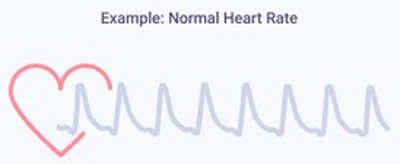|
|
| 2. Heart Rate |
This is the number of times your heart beats per minute. The normal resting rate is 60 to 100 beats for a healthy adult.

Think of your heart as a pump that pushes blood through your body. With every beat, the heart pumps blood containing oxygen and nutrients around the body and brings back waste products. A healthy heart supplies the body with the right amount of blood at a rate proportionate to whatever activity the body is undertaking.
Normal resting rates can differ between people. Furthermore, heart rates are lower when at rest and increase during exercise. Moreover, this rate can change with different situations such as the weather, body position, emotions, body size, medication, and the use of caffeine and nicotine.
At rest, a fast Heart Rate may indicate acute health conditions such as an infection, dehydration, stress, anxiety, thyroid disorder, shock, anemia, or certain heart conditions. Moreover, it can predict long-term risk for cardiovascular events. A low Heart Rate is common for people who exercise frequently and participate in athletics.
Tracking Heart Rate can provide insight into fitness levels, heart health, and emotional health.
Moreover, for individuals taking medication for cardiovascular conditions, daily Heart Rate measurements can assist the doctor in advising on the proper course of treatment.
A healthy heartbeat is important in protecting cardiac health. If you feel that your heart is beating out of rhythm (too fast or too slow), speak to a doctor about your symptoms. |
| |
|